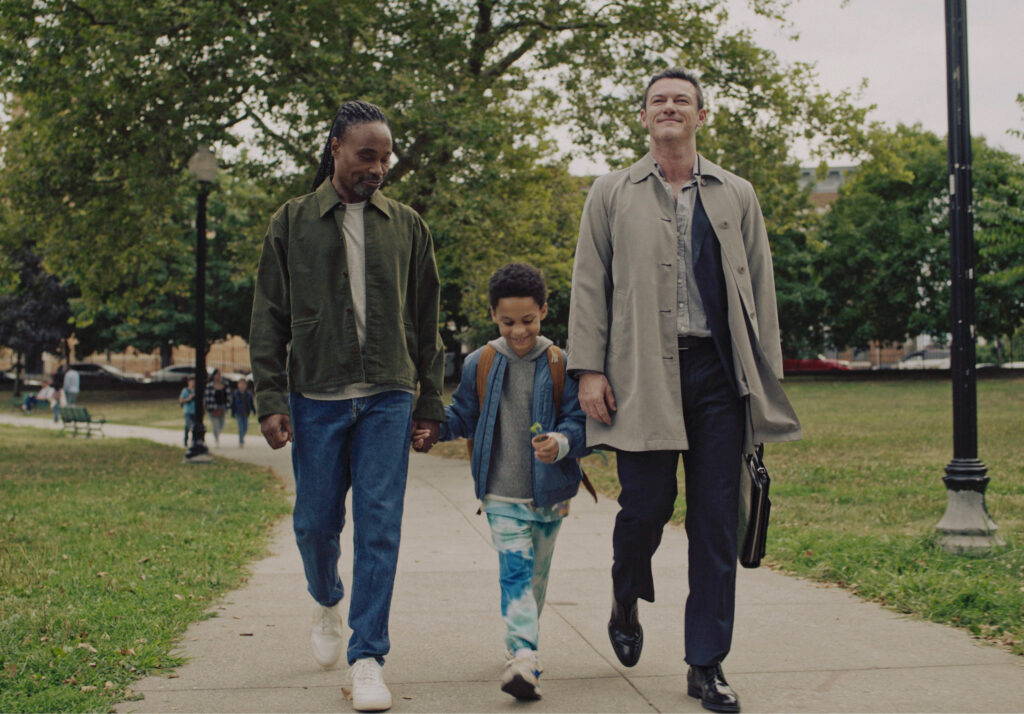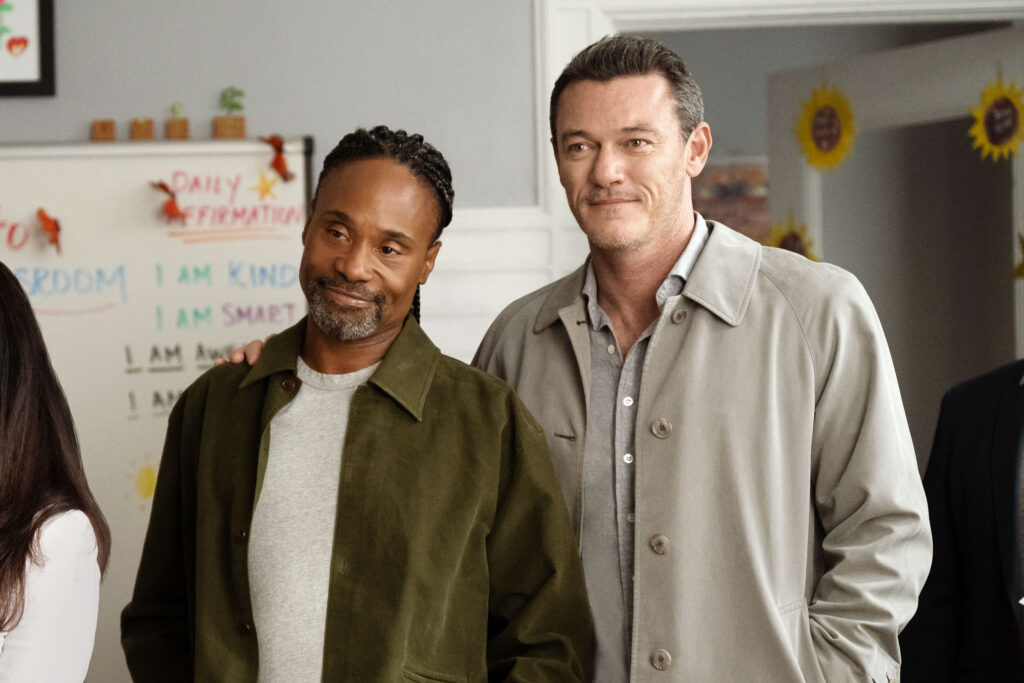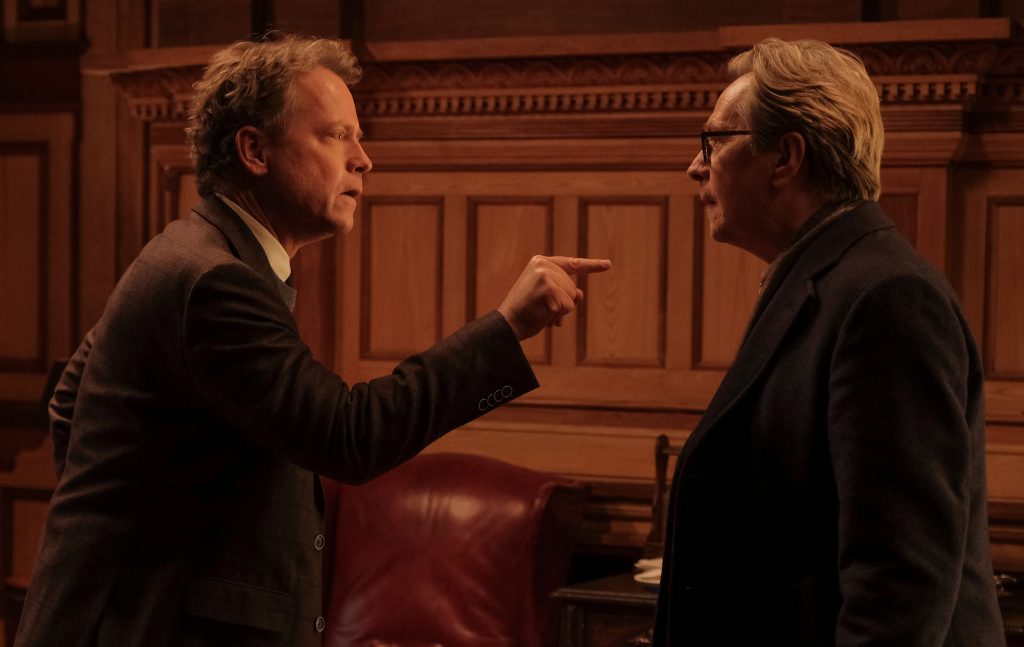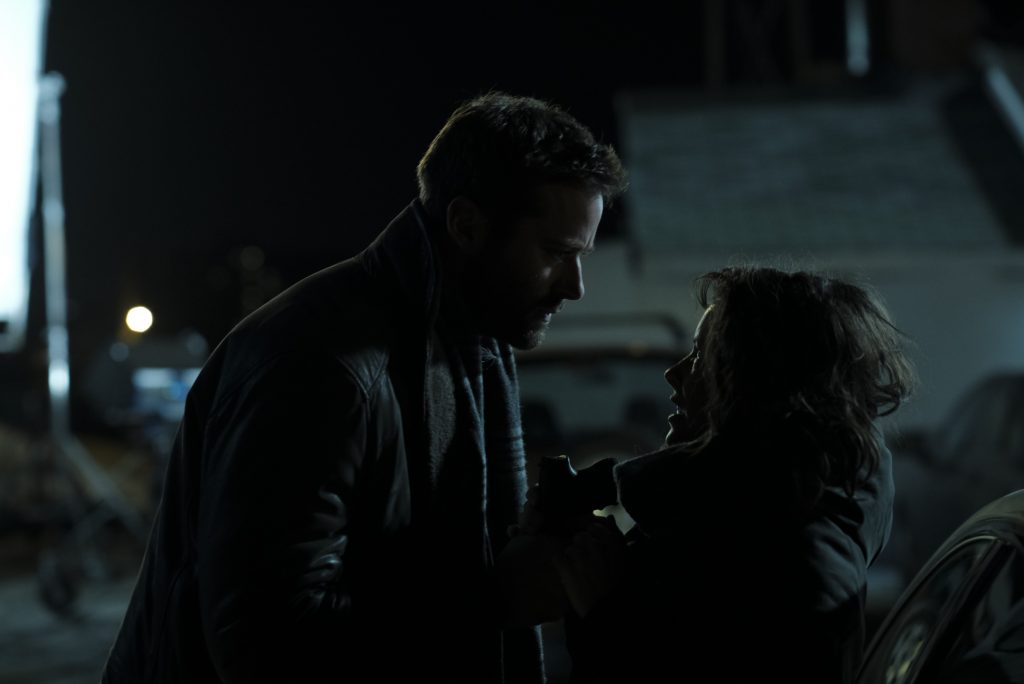March 25, 2024
by Carla Hay

Directed by Phil Allocco
Culture Representation: Taking place in New York City, the dramatic film “5Lbs of Pressure” features a predominantly white cast of characters (with some African Americans and a few Asians) representing the working-class, middle-class and criminal underground.
Culture Clash: After spending 16 years in prison for murder, an ex-con is paroled and tries to form a bond with his estranged teenage son, as the brother of the ex-con’s murder victim contemplates getting revenge on the ex-con.
Culture Audience: “5Lbs of Pressure” will appeal primarily to people who are fans of the movie’s headliners and tacky crime dramas that are trying to be more artistic than they really are.
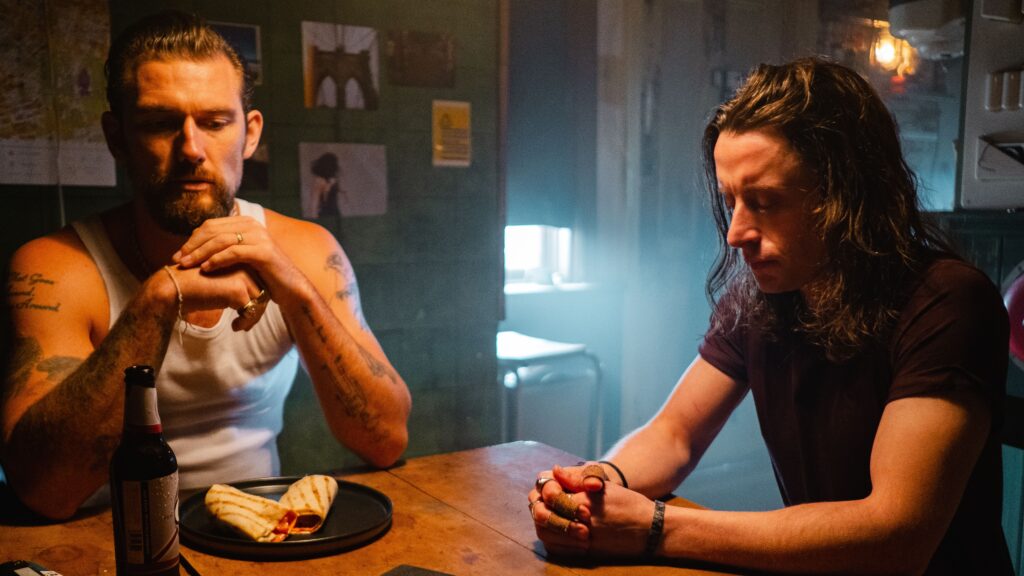
“5Lbs of Pressure” tries to be a gritty and realistic crime drama with multiple storylines converging. But the clumsy handling of the plot and the vapid dialogue result in an unappealing mush of a movie that lacks suspense. If you can imagine what 2005’s “Crash” would be if it had a lower budget and all of the main characters were connected in some way to criminal activities, then you have a pretty good idea of what type of movie “5Lbs of Pressure” wants to be but comes up very short.
Written and directed by Phil Allocco, “5Lbs of Pressure” is based on his 2005 short film “The Mirror.” The title of “5Lbs of Pressure” refers to a scene in the movie when someone with a gun tells one of the main characters that the gun has only five pounds of trigger pressure. It’s a title that is meant to convey how little strength it takes to pull the trigger on a gun that can kill.
So much of “5Lbs of Pressure” looks like it wants to be artistically meaningful, but the movie has a shaky foundation of a substandard screenplay and unfocused direction that are not helped by unimpressive acting from most of the cast members. The movie takes place in New York City but was actually filmed in Manchester, England.
In “5Lbs of Pressure,” there are three main characters whose lives cross paths in the movie’s big climactic scene.
- Adam DeSalvo (played by Luke Evans) is a recently paroled ex-con, who spent 16 years in prison for murdering a young male stranger because of a petty argument.
- Eli (played by Zac Adams) is the angry younger brother of the guy who was murdered.
- Mike (played by Rory Culkin) is a dimwitted drug dealer who really wants to be a professional musician.
“5Lbs of Pressure” goes through a tedious and often lackluster back-and-forth between showing the storylines for these three characters. Adam is first seen showing up unannounced at the workplace of his friend Steve (played Jazz Lintott), who owns a small business. Adam has recently been discharged from a halfway house and needs a place to live. The best that Steve can offer at the moment is a cluttered and small storage room, which Adam accepts.
Adam tells his parole officer Patricia Earl (played by Julee Cerda) that he’s gotten a job as a bartender at a pub called Mirror Bar, located in Brooklyn’s Red Hook neighborhood. The opening scene of “5Lbs of Pressure” shows Mirror Bar from the outside at night, while gunshots are being fired inside the bar. The movie then circles back to this scene to show what happened during this shootout.
As an example of how poorly written “5Lbs of Pressure” is, parole officer Patricia tells Adam that because he’s a convicted murderer on parole, he’s not supposed to have a job where he will be around a lot of alcohol. He’s also not supposed to be in places, such as Mirror Bar, which are known hangouts for criminals. Adam tells her that having this job is better than being unemployed, so Patricia quickly drops the matter.
In reality, a parole officer could get in serious trouble for knowing about this parole violation and not doing anything about it. There would also be other people who could easily find out about this parole violation and get Adam in trouble. But “5Lbs of Pressure” doesn’t care about those realistic details because of how it wants to contrive the movie’s climactic scene at Mirror Bar.
Meanwhile, Mike works for his uncle Leff (played by Alex Pettyfer), a local drug dealer who has a nasty temper and who constantly disrespects and belittles Mike. Leff sells cocaine and marijuana, but he thinks he has “ethics” because he refuses to become a heroin dealer, no matter how lucrative the offer. Leff’s sister, who was Mike’s mother, died of a heroin overdose.
Eli, Mike and a thug named Sicky (played by James Oliver Wheatley) work for Neff. All of them regularly snort cocaine. Mike and Eli are in a rock band together that’s on the level of playing small nightclubs, but the band seems to be going nowhere its career. Mike is more committed to being a musician than Eli is.
Eli is currently preoccupied with thoughts of revenge because he knows that Adam has been paroled. Eli and his widower mother Anna (played by Olivia Carruthers) are upset that Adam didn’t get a longer prison sentence. Eli is offended that Adam has gone back to live in the same neighborhood where Eli’s family lives. Eli is also having some relationship problems with his girlfriend Lori (played by Savannah Steyn), who doesn’t want to live in New York City anymore.
There’s a very monotonous part of the movie about Mike wanting to do a heroin deal that would get him out of debt to a local gang boss named E.R. (played by Gary McDonald), but Neff is completely against the idea of dealing heroin. Mike secretly goes to Neff’s drug supplier Jamal (played by Lorraine Burroughs, doing a very fake-sounding Caribbean accent) to set up the heroin deal on his own, without telling Leff. You know where all of this is going, of course.
One of Neff’s customers is a rebellious 16-year-old named Jimmy (played by Rudy Pankow), who was told all of his life by his bitter single mother Donna (played by Stephanie Leonidas) that she and Jimmy were abandoned by Jimmy’s father, whom she was married to for an unnamed period of time. Jimmy will soon find out that Donna didn’t tell Jimmy the entire truth: Jimmy’s father Adam wasn’t there for them because he was in prison for murder for the past 16 years, and she cut off all contact with Adam. Jimmy was born while Adam was in prison.
This major plot point (which is not spoiler information) is another example of how the “5Lbs of Pressure” screenplay is badly conceived. Considering that Jimmy and Donna live in the same area where Adam used to live before Adam went to prison, it’s very hard to believe that Jimmy wouldn’t be able to find out what happened to Adam before Adam got out of prison. It’s as if the “5Lbs of Pressure” filmmakers want viewers to believe that no one in the community would tell Jimmy the truth about Adam, or that Jimmy is incapable of doing an Internet search.
At any rate, “5Lbs of Pressure” tries to shoehorn in some family melodrama and sentimentality, as Adam tries to get back in Jimmy’s life, against the vehement objections and disapproval of Donna. Adam is a recovering drug addict who likes to draw illustrations in his spare time. Adam shows his drawing talent to Jimmy and encourages Jimmy to start drawing too.
“5Lbs of Pressure” isn’t a completely terrible movie. It just has just too many boring or idiotic scenes that outnumber anything in the film that can be considered enjoyable entertainment. The acting performances range from adequate to lackluster to awful. The movie’s ending is meant to be “shocking,” but it’s actually quite predictable because of all the clues that are telegraphed so blatantly. “Crash” is remembered for being a controversial Oscar winner for Best Picture, but “5Lbs of Pressure” can’t even claim to be very memorable at all.
Lionsgate released “5Lbs of Pressure” in select U.S. cinemas, on digital and VOD on March 8, 2024.

